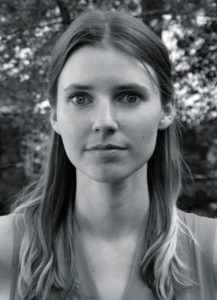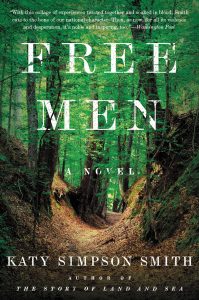
Who says a historian has to stick to the facts? When Katy Simpson Smith, PhD ‘11, got a major book advance from HarperCollins, she left her adjunct teaching position at Tulane University to write fulltime—and now she’s the author of two acclaimed historical novels. Her historical training continues to inform her work, and historians and novelists might learn from one another’s approaches, she said.
“I’ve always loved telling stories,” Smith said, “and I’ve always loved the past which is just a landscape of stories waiting to be told, or retold.” History has become fertile ground for Smith’s fiction. The Story of Land and Sea (2014) traces a family in coastal North Carolina in the aftermath of the Revolutionary War. Smith’s second novel, Free Men (2016), imaginatively recounts a murder committed by a Creek Indian, a white man, and an escaped slave and the circumstances that drew them together. Smith blends a deep understanding of the American past with an empathetic sense of shared human experience. The New York Times praised her “spare, rhythmic prose” and “refusal to serve up false redemption.”
These novels grew from the research that Smith did for her dissertation on colonial and early republican womanhood in the American South, directed by Kathleen DuVal and Jacquelyn Hall. “Having that familiarity with late 18th-century thought and behavior was invaluable in creating a sturdy foundation for my fictional fancies,” she said. In her dissertation, a cross-cultural study of black, white, and native mothers in the American South, Smith argued that motherhood was the defining experience in early American women’s lives. Women embraced motherhood because it provided purpose and power within their communities. However, despite the universal role of the mother across cultures, Smith concluded that little sense of female solidarity extended across racial lines. In 2013 Louisiana State Press published the book based on her dissertation, We Have Raised All of You: Motherhood in the South, 1750–1835.
While in graduate school, Smith balanced research demands with fiction writing. “I can’t say when I found the time to work on short stories,” she said, but she and several graduate students formed an “informal fiction writing club.” She also took advantage of the University’s resources. She shared her work with Dave Shaw, a local writer who works for the Center for the Study of the American South. In 2009 she took an online fiction class at the Friday Center before applying to an MFA program at the Bennington Writing Seminars in Vermont.
 In some respects, Smith’s sideline in fiction fit awkwardly with the rigors of academic history. It “still felt secretive, shameful,” she said. She admitted hiding her writing “from my advisors until the last possible moment.” “Perhaps I’d learned to divide my life into imagination versus research,” she reflected. “But as the best historians and writers will tell you, the two should be inseparable.”
In some respects, Smith’s sideline in fiction fit awkwardly with the rigors of academic history. It “still felt secretive, shameful,” she said. She admitted hiding her writing “from my advisors until the last possible moment.” “Perhaps I’d learned to divide my life into imagination versus research,” she reflected. “But as the best historians and writers will tell you, the two should be inseparable.”
After graduation, Smith felt she must either “land a tenure-track teaching position, or throw history to the wind.” This dichotomy “can partly be blamed on youth,” but she also noted that the “pipeline mentality” of graduate programs—the sense that a PhD is a rigid process leading to one fixed end—“can contribute to students feeling a bit desperate.”
Embracing fiction as a career has brought challenges. Smith had to “unlearn the rules about evidence and allow myself to invent.” She could “step out of the academy’s confining linguistic suit and shake things loose a bit…Though it felt liberating, I also know that the discipline I learned at UNC still informs how I write.” Good historical writing is a powerful model, Smith said, and “the history faculty at UNC” are “some of the most inventive and most humane writers I know.”
Ultimately, Smith realized that the stories she wanted to write were compatible with—and even demanded—an appreciation for historical thinking. “My fiction is heavily research-based, no matter what era I’m writing about, and I wouldn’t have the skills or stamina to do this without my UNC training.” “History is such a looping, circular thing,” she explained, “I’ll never get tired of digging in that soil for explanations and for glimmers of a different way forward.”
Smith believes fiction and academic history can enrich one another. “Historians can learn from novelists not to be wary of empathy.” And “novelists can learn from historians that human action never occurs in a vacuum.” She tries to “balance historical specificity” with “a kind of universal human spark.” Of course, “‘universal’ is a dirty word for historians, and so it should be,” but “in writing fiction part of our job is to knit together the reader and the character with a common, recognizable thread.” For historians, too, this connection is “vital in awakening in the modern reader a necessary empathy.”
Joshua Tait
